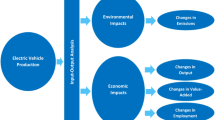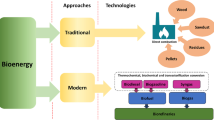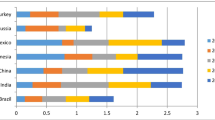Abstract
The selection of basic research priorities plays an important role in efficient science policy. After the economic crisis in 2008 many countries turned its attention to R&D of energy resources. Effective development of R&D could contribute to efficiency of oil and gas processing and improve Russian prosperity. The goal of our study is to examine trends in Russian research performance (RP) and compare them with other leading industrialized countries. More detailed analysis was focused on tracing evolution in the research area (by WoS classification) as Energy&Fuel (E&F), which is invaluable for the Russian economy. Sources of data were Science Citation Index-Expanded (SCI-E) that is the part of Web of Science (WoS), analytical tool InCites and the national database Russian Science Citation Index—Clarivate. World dataset demonstrated the growth rate in total research performance (RP) by 140% (2,006,082 records) in 2017 compared to 2008 (1,416,233 records). Russian RP growth rate was the same as in world dataset in 2008–2017. Our analysis revealed that two of each RA Science Technology and Other Topics, and Energy & Fuels (E&F) demonstrated striking growth rate (in three-fold) comparing with growth rate 140% in the world dataset during 2008–2017. Total amount of Russian RP on E&F consisted of 4237 records indexed in SCI-E and 6300 records indexed in RSCI-C for 10 years. During the last 10 years, Russia significantly improved various citations indicators of RP on E&F. The share of publications in top 1% and top 10% journals increased. Russian RP growth rate on E&F was about 200%. Despite the growth its impact is low compared to leading industrial countries. A significant disparity was revealed in RP distribution by leading organizations in SCI-E and RSCI-C. Powerful Russian oil and gas companies are practically absent among organizations indexed in SCI-E. Contrarily, the national Russian database RSCI-C revealed a network of regional branches of the famous private oil company named “Lukoil”. Russian international collaboration (IC) on E&F is significantly less (about 8–10%) than in total Russian RP. The negative factor is low number of IC on E&F with each of traditional Russian partners as Germany and USA. Value of Jaccard index of almost all countries collaborating with Russia (besides Kazakhstan’s 0.46) is no higher than 0.2. This indicates significant difference in direction of research. Our data could be useful as a source for effective decision-making.


Similar content being viewed by others
References
Abbott, A., & Schiermeier, Q. (2014). Central Europe up-close. Nature,515, 2–4.
Gibson, A. G., & Hazelkorn, E. (2017). Arts and humanities research, redefining public benefit, and research prioritization in Ireland. Research Evaluation,26(3), 199–210.
Gilyarevskii, R., Libkind, A., & Markusova, V. (2019). Dynamics of Russian publications activity 1993–2017. Automatic Documentation and Mathematical Linguistics,53(2), 51–63.
Glänzel, W. (2003). Bibliometrics as a research field: A course on theory and application of bibliometric indicators. Course Handouts, Leuven. Retrieved January 8, 2019, from http://nsdl.niscair.res.in/jspui/bitstream/123456789/968/1/Bib_Module_KUL.pdf.
Ivanov, V. V., Markusova, V. A., & Mindeli, L. E. (2016). Government investments and the publishing activity of higher educational institutions: Bibliometric analysis. Herald of the Russian Academy of Sciences,86(4), 314–321.
Karaulova, M., Abdullah, G., Shackleton, O., & Shapira, P. (2016). Science system pass-dependencies and their influences: Nanotechnology research in Russia. Scientometrics,100(3), 365–383. https://doi.org/10.1007/s11192-016-1916-3.
Mindeli, L. E., Ivanov, V. V., Libkind, A. N., & Markusova, V. A. (2016). Bibliometric approach to national collaboration analysis based on co-authorship: Web of Science, 2006–2013. Scientific and Technical Information,Ser. 1, 8, 14–23.
Mindeli, L. E., Ostapyuk, S. F., & Fetisov, V. P. (2019). On long-term prediction of fundamental and exploratory research. Economics and Mathematical Methods,55(1), 56–67.
Moed, H., Markusova, V., & Akoev, M. (2018). Trends in Russian research output indexed in Scopus and Web of Science. Scientometrics,118(2), 1153–1180. https://doi.org/10.1007/s11192-018-2769-8.
Movchan, A., & Koshkin, P. (2017). Russia and the “resource curse”: When the Kremlin’s policy is counterproductive for the economy. Retrieved May 29, 2019, from https://carnegieendowment.org/publications/68753
Pislyakov, V., Moskaleva, O., Akoev, M. (2019). Cui Prodest? Reciprocity of collaboration measured by Russian Index of Science Citation. In Proceedings of ISSI 2019—the 17th international conference on scientometrics and informetrics (pp. 185–195). Italy: Sapienza University of Rome.
Radocevich, R., & Yoruk, L. (2014). Are there global shifts in the world science base? Analyzing the catching up and falling behind of world regions. Scientometrics,101(3), 1897–1924. https://doi.org/10.1007/s11192-014-1344-1.
Smith, A., Lai, S. Y., Bea-Taylor, J., Hill, R., & Kleinhenz, N. (2016). Collaboration and change in the research networks of five Energy Frontier Research Centers. Research Evaluation,25(4), 472–485. https://doi.org/10.1093/reseval/rvw006.
Tekingunduz, A. (2018). How oil prices impact Russia’s economy. Retrieved June 2, 2019, from https://www.trtworld.com/europe/how-oil-prices-impact-russia-s-economy-22067
Turko, T., Bakhturin, G., Bagan, V., Poloskov, S., & Gudym, D. (2016). Influence of the program “5-top 100” on the publication activity of Russian universities. Scientometrics,109, 769–782. https://doi.org/10.1007/s11192-016-2060-9.
Wang, Z., Porter, A., Kwon, S., Youtie, J., & Shapira, P. (2019). Updating a search strategy to track emerging nanotechnologies. Journal of Nanoparticle Research,21, 199. https://doi.org/10.1007/s11051-019-4627-x.
Acknowledgements
Authors express the gratitude to the Russian Foundation for Basic Research for financial support (Grants 17-02-00157 and 17-02-00078) and to Clarivate Analytics for the opportunity to use the data.
Author information
Authors and Affiliations
Contributions
MA: data collection (InCites, SciVal), analysis, manuscript draft discussion, editing. AL: data collection (WoS), analysis, manuscript draft discussion, editing. VM: acquired funding, conception, analysis, data collection (InCites), first draft of manuscript, editing. LM: conception analysis, acquired funding, manuscript draft discussion, editing. All authors read and approved the manuscript.
Corresponding author
Additional information
This paper is dedicated to the memory of Judit Bar-Ilan (1958–2019), an outstanding scholar and an inimitable friend and colleague.
Rights and permissions
About this article
Cite this article
Markusova, V., Mindeli, L., Libkind, A. et al. Comparative analysis of Russian and industrialized countries performance on Energy and Fuels, WoS, 2008–2017. Scientometrics 123, 1281–1300 (2020). https://doi.org/10.1007/s11192-020-03440-6
Received:
Published:
Issue Date:
DOI: https://doi.org/10.1007/s11192-020-03440-6




